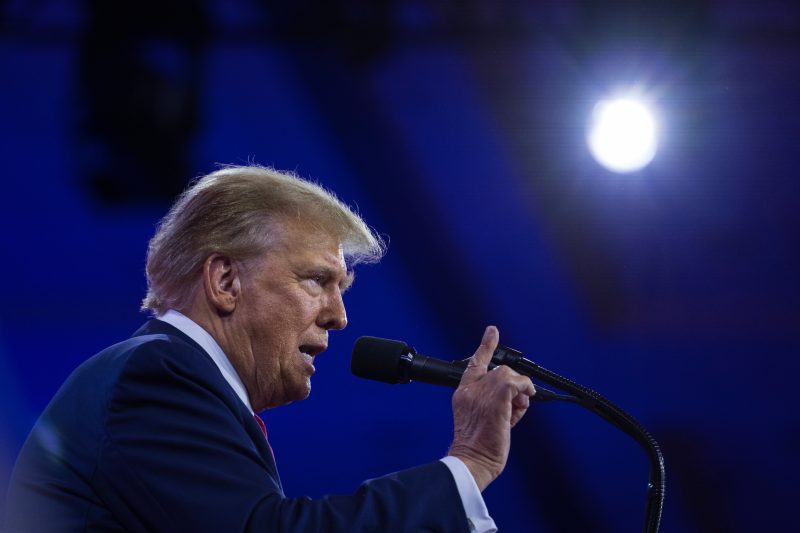NEW YORK — A New York judge on Wednesday rejected a request from Donald Trump to delay enforcement of a judgment totaling at least $450 million while he appeals that order, but allowed the former president’s adult sons to remain in leadership positions at the Trump Organization for the time being.
The decision dealt with a separate judge’s order this month in a civil fraud case that imposed millions of dollars in punishments, plus interest, against Trump and other defendants including his adult sons, Donald Trump Jr. and Eric Trump.
New York Supreme Court Justice Arthur Engoron had determined in that case that Trump and others had given false data to financial institutions and insurance companies so they could borrow money at lower rates and save on costs. Engoron hit Trump with the hefty financial penalty and gave him and his sons years-long bans from holding top jobs in New York corporations, among other punishments.
On Wednesday, Trump’s lawyers asked an appeals court judge to stay Engoron’s judgment, which they assailed as “unprecedented and punitive.” His attorneys also sought to post a $100 million bond rather than the fuller amount, which they suggested could top $500 million, and suggested that if a stay was not granted, the defendants could be forced to sell properties.
Associate Justice Anil C. Singh in the New York State Supreme Court’s Appellate Division swiftly rejected the attempt to delay the judgment. Singh did not directly address the request to let Trump post the $100 million amount, but his brief decision declined to delay “the enforcement of monetary judgment,” which appears to mean Trump has to pay the full amount.
Singh granted a temporary stay to Engoron’s directive that blocked Trump and his company from seeking loans from financial institutions in New York for three years, which Trump’s attorneys had suggested was a hindrance to posting the full bond.
Singh’s actions Wednesday could be altered or undone in the coming weeks. A full panel is expected to review the case and issue a decision on March 18.
Trump, who is running again for president, has faced a whirlwind of legal trouble and financial jeopardy. Even before Engoron’s judgment, Trump had been ordered by juries in two separate civil cases to pay nearly $90 million to the writer E. Jean Carroll, who sued him for defamation. Trump also faces charges in four criminal cases, including one set to go to trial in Manhattan next month.
While Singh’s order blocks part of Engoron’s decision, it leaves intact the part of that judgment that has loomed largest: the financial penalty.
Attorneys for Trump and other defendants had written in court filings that Engoron imposed a “facially absurd” financial penalty as part of “a zealous quest to inflict untoward punishment” in the case.
They also suggested that it was impractical to imagine he has such a cache of cash on hand. During the hearing before Singh, Christopher Kise, an attorney for Trump, said rounding up so much cash would be a hurdle for even the country’s wealthiest residents, lumping his client in with them.
“No one, including Jeff Bezos, Elon Musk and Donald Trump, has five hundred million laying around,” Kise said.
The case originated with a lawsuit filed by New York Attorney General Letitia James (D), who accused Trump and other defendants — including his adult sons and the Trump Organization, the family company — of committing a years-long financial fraud.
Engoron heard the case without a jury, then released his decision on Feb. 16. He ordered Trump to pay more than $354 million in penalties, plus interest — putting the amount at more than $450 million. Both of Trump’s adult sons were also fined $4 million each.
James’s office pushed back on Trump’s desire to stay the judgment or let him post a lower amount, writing that there was “no merit” to the suggestion that posting a portion of the judgment would be sufficient. Instead, her office wrote, there was “substantial risk that defendants will attempt to evade enforcement of the judgment (or make enforcement more difficult) following appeal.”
During the hearing, Dennis Fan, an attorney speaking for James’s office, depicted Trump’s side as trying to wiggle out of giving up control of assets without saying they could not afford the full bond.
“I think if you read between the lines, what they’re saying is we don’t want to put up the collateral,” Fan said.
Attorneys for Trump and other defendants wrote in court papers that they planned to “secure and post a bond in the amount of $100 million.” An appeal bond, they wrote, would include the amount of the judgment, along with costs and interests during the appeal process, which could push the total bond amount to more than $550 million. They highlighted the blockade on loans as a hurdle to posting the bond.
“The exorbitant and punitive amount of the Judgment coupled with an unlawful and unconstitutional blanket prohibition on lending transactions would make it impossible to secure and post a complete bond,” the attorneys said.
The attorneys also raised the prospect of having to sell off properties if the stay was not granted as requested. Without such a stay, they wrote, “properties would likely need to be sold to raise capital under exigent circumstances.” Then, they wrote, even if the appeal succeeds, there would be no way to regain control of those properties or “recover the resulting financial losses.”
Engoron’s decision, coming on the heels of a separate $83.3 million judgment against Trump after one of Carroll’s lawsuits concluded last month, means he could face a significant cash crunch. Legal experts say that to keep the judgments from being enforced amid appeals, Trump must put up the entire amount in cash or bonds. Much of Trump’s wealth is entwined with real estate, so it remains unclear how much cash he has available or how he could put up the money.
Trump has repeatedly likened his properties to great works of art that he does not like to sell, but he has sold two recently: the lease to his luxury D.C. hotel, now a Waldorf Astoria, and the license to operate the Ferry Point golf course in New York City. Both properties were technically owned by the government, making them more complicated for him to own while president, unlike the vast majority of his portfolio.
He has made no public moves to recently list or sell the other top properties in his portfolio. Trump lists 22 assets — most of them real estate — as valued at “over $50 million” each, according to a Post analysis of a government filing he submitted in August.
Those include his stakes in Trump Tower, Mar-a-Lago, an office building at 40 Wall Street, golf courses and hotels. Some of his golf and hotel properties have suffered since his entry into politics, as Democrats and others opposed to Trump have avoided patronizing them, but they still produce hundreds of millions of dollars in revenue for him annually.
Few of his properties carry debt, according to the form, meaning he would probably reap a large portion of any sale amounts after taxes. He has a $100 million loan on Trump Tower, in Manhattan, and a $125 million loan on his Doral resort in South Florida. Only one other property, 40 Wall Street, carries a loan of more than $50 million, according to the form.
Berman reported from Washington. Clare Ence Morse and Jonathan O’Connell contributed to this report.








